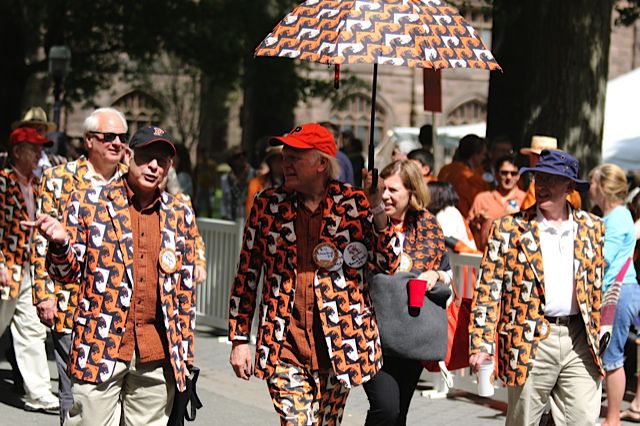By Philip Sean Curran, Staff Writer
By Philip Sean Curran, Staff Writer
Princeton University President Christopher L. Eisgruber told alumni Saturday that he would like to build two dormitories on campus, with an eye toward further expanding the undergraduate student body.
Nassau Hall already has announced plans to phase in 500 more undergraduates, but Eisgruber’s comments suggest that he would like to see even more students attending one of the nation’s most selective private universities. At the moment, Princeton has 5,277 undergraduates, but it offered admission to only 6.1 percent of the 31,056 applicants for the incoming freshman class, according to data on the university web site.
Eisgruber, speaking on the annual Reunions weekend, emphasized that a Princeton education is “transformative” and talked of his desire to expand access to it.
“We need to be drawing talent from every sector of our society if we’re going to succeed at fulfilling our aspirations to excellence,” he said from the stage of Richardson Auditorium on campus.
The school has identified current athletic facilities as the site of a new dormitory. But Eisgruber said he would like to put two there.
“The reason I’d like to build two residential colleges is that right now we have no capacity to renovate our existing dormitories,” he said. “We have no capacity to renovate any dormitory on this campus right now, because the only way we could do that is to reduce the number of students we’re taking. So the only way we make progress there is if we can build a couple of residential colleges, which allows us to renovate and then somewhere down the road expand again.”
His comments come with the university planning the next phase of its growth, including expanding across Lake Carnegie onto land that Nassau Hall owns in West Windsor.
In terms of the makeup of the student body, he pointed to how 17.5 percent of the incoming freshman class is from families where neither parent went to college.
Touching later on the costs of college education, he said 60 percent of Princeton students are on financial aid, while 83 percent of recent graduates graduated without debt. He pointed to the growth in the number of students who get federal Pell grants, intended for children from low-income families, from 7.2 percent more than a decade ago to 21 percent for the current freshmen class.
“One of the things I think ought to unify us as a country, at a time when we’re divided on a lot of things, is the idea that in this country regardless of what your parents’ income is and to what kind of family you’re born, if you’re talented and you work hard, you ought to be able to succeed and you ought to be able to get a great college education, and that’s what this effort reflects,” he said.
Eisgruber, a Princeton alumnus dressed in his orange and black stripped jacket from his 25th reunion, spoke for roughly an hour to a friendly audience, one that likely would be expected to help foot the bill of any new construction through charitable giving to the university.
As the 20th president in university history, Eisgruber, 55, has been leading Nassau Hall since the middle of 2013. In that time, he often has used his public remarks to emphasize the value of a liberal arts education.
Yet he sought to downplay the school’s top ranking by U.S. News & World Report, in which he said the ranking is a result of an “arbitrary formula.”
He later talked of some of the steps Princeton took to oppose the Trump administration’s travel ban on people from a group of mostly Muslim countries. He said about 30 percent of Princeton faculty are foreign citizens and 40 percent of Princeton graduate students come from outside the United States.
“Virtually everybody on the campus is affected indirectly and two degrees of separation to somebody who’s specifically affected by the travel ban put into place,” he said. “And we remain dedicated to promoting the free flow of scholars and ideas across international boundaries. We think it’s critical to what we do as a university.”
He later touched on free speech at colleges, at a time when conservatives speakers find themselves being silenced. He joked that U.S. Sen. Ted Cruz (R-Texas), a Princeton alumnus back for his 25th reunion, was “stealing my audience” appearing at an event on campus at the same time as Eisgruber.
“So one of the most important things that we have to do as a university is provide a forum for free speech and academic freedom,” he said. “And we are failing if we don’t have multiple contending views representing the division of opinion in America right now.”

